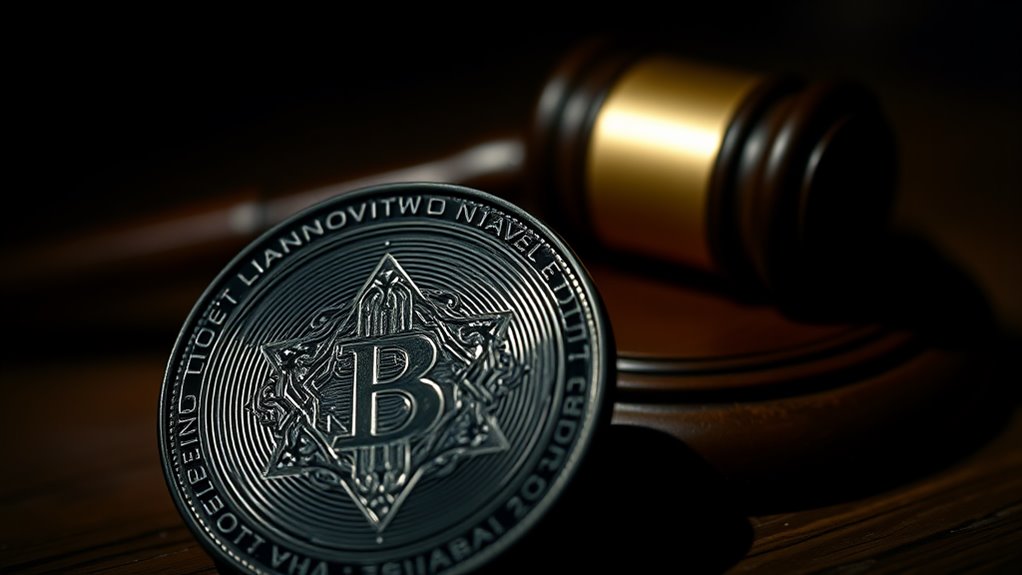
Legal Issues With Privacy Coins: Regulatory Challenges & Future Implications
Privacy coins face significant regulatory challenges worldwide, with countries like Japan and South Korea implementing outright bans while others maintain more balanced approaches. These cryptocurrencies create tension between financial privacy rights and security needs, complicating AML/KYC compliance. Exchanges often delist privacy coins, reducing liquidity and market access. Future viability depends on technological innovations that balance anonymity with regulatory requirements. The evolving landscape offers potential solutions through selective transparency and specialized reporting protocols.
Key Takeaways
- Privacy coins face inconsistent global regulations, with some jurisdictions implementing balanced frameworks while others enforce outright bans.
- Anonymity features in privacy coins create significant AML/KYC compliance challenges for financial institutions and law enforcement agencies.
- Cross-border enforcement remains problematic due to jurisdictional conflicts and limitations in data sharing for tracking illicit transactions.
- Major exchanges delisting privacy coins reduces liquidity and creates adoption barriers, pushing users toward decentralized platforms.
- Emerging technologies like zero-knowledge proofs and selective transparency features aim to balance user privacy with regulatory compliance requirements.
The Regulatory Landscape for Privacy-Focused Cryptocurrencies

As governments worldwide grapple with the implications of blockchain technology, the regulatory landscape for privacy-focused cryptocurrencies has emerged as a complex and evolving domain.
Countries have adopted vastly different approaches, with Germany and Switzerland implementing more balanced regulatory frameworks, while Japan has outright banned privacy coins.
Regulatory bodies like FinCEN in the United States are instrumental in shaping policies that attempt to balance financial privacy with anti-crime measures.
As technological advancements continue in the privacy coin space, regulatory frameworks must adapt accordingly.
This shifting landscape creates significant adoption challenges for privacy coins.
The constant evolution of regulations reflects governments’ ongoing struggle to accommodate legitimate privacy concerns while preventing potential misuse in illicit activities.
Achieving consistency across jurisdictions remains a primary challenge in creating effective global standards. Additionally, the regulatory environment varies significantly across regions, with countries like Japan and the U.K. implementing progressive rules.
Money Laundering Concerns and AML Compliance Requirements

The regulatory landscape surrounding privacy coins opens directly to their most significant challenge: money laundering concerns and compliance with anti-money laundering (AML) regulations.
The anonymity features of privacy coins, such as Monero’s ring signatures and ZCash’s shielded addresses, create significant obstacles for financial institutions and law enforcement agencies tracking illicit activities.
Several countries have taken decisive action in response to these concerns. Japan and South Korea have implemented outright bans, while Dubai has recently restricted privacy coins. China’s extensive cryptocurrency ban includes privacy coins as well.
These regulatory responses stem from the technological limitations in monitoring blockchain transactions and the borderless nature of cryptocurrency exchanges. The complexity of tracing privacy coin transactions requires advanced analytics tools and international cooperation among law enforcement agencies to effectively combat potential money laundering activities. Additionally, anti-money laundering regulations continue to be a focal point as they are vital in mitigating financial crime risks associated with cryptocurrencies.
Exchange Delistings: Impact on Market Access and Liquidity

While regulatory scrutiny of privacy coins continues to intensify globally, major cryptocurrency exchanges have responded with widespread delistings that profoundly impact market dynamics for these assets.
These actions greatly reduce liquidity, creating barriers to adoption and increasing price volatility.
As exchanges implement monitor tags and enhanced surveillance measures, privacy coin availability becomes increasingly limited.
Users often turn to decentralized exchanges, which offer less regulated alternatives but typically feature lower trading volumes.
Some privacy coin projects have developed compromise solutions, including “exchange-only” addresses and partially transparent systems that attempt to balance privacy with compliance requirements.
The geographic disparity in regulations further fragments the market, with particularly stringent measures in the EU, United States, and Asia-Pacific regions.
This regulatory pressure has sparked innovation within privacy coin communities as they work to maintain functionality while addressing compliance concerns. Furthermore, businesses involved with privacy coins must navigate anti-money laundering regulations to ensure compliance with evolving legal standards.
Cross-Border Enforcement Challenges in Cryptocurrency Regulation

Cross-border enforcement of regulations concerning privacy coins creates complex jurisdictional conflicts that require novel resolution mechanisms between international authorities.
Law enforcement agencies face significant limitations in sharing data across borders, hampering their ability to track illicit transactions conducted through privacy-enhancing cryptocurrencies.
These enforcement challenges are further complicated by varying extradition treaty provisions, which may not adequately address cryptocurrency-related offenses, creating potential safe havens for those engaging in unlawful activities with privacy coins.
Jurisdictional Conflict Resolution
Despite significant advances in cryptocurrency regulation, jurisdictional conflicts remain a persistent challenge for enforcement agencies worldwide. The decentralized nature of blockchain technology creates ambiguity about which nation’s laws apply during cross-border transactions, complicating enforcement efforts. As policymakers navigate these complexities, clarity in regulatory frameworks is crucial for fostering innovation and stability in the crypto space.
| Conflict Resolution Approach | Description | Effectiveness | Key Limitations |
|---|---|---|---|
| International Agreements | FATF standards and guidelines | Moderate | Voluntary adoption |
| Joint Investigations | J5 collaborative enforcement | High | Limited to member nations |
| Regulatory Harmonization | EU’s MiCA framework | High | Regional, not global |
| Technology-Based Solutions | Blockchain analytics tools | Moderate | Privacy coin resistance |
Successful resolution requires coordinated approaches blending legal frameworks, technological solutions, and multilateral cooperation. As regulatory authorities continue developing thorough frameworks, the focus must remain on balancing innovation protection with effective enforcement mechanisms that respect jurisdictional sovereignty while addressing cross-border challenges.
Data Sharing Limitations
The enforcement challenges that plague jurisdictional conflicts extend directly into the domain of data sharing limitations. Privacy-focused cryptocurrencies like Monero and Zcash deliberately obscure transaction details, creating significant barriers for regulatory oversight.
The inherently decentralized nature of blockchain networks compounds these issues by dispersing data across global nodes.
Cross-border transactions further complicate matters as they involve multiple jurisdictions with varying regulatory frameworks. Despite FATF guidelines and KYC/AML requirements attempting to standardize information sharing, the absence of uniform global standards creates significant gaps in regulatory coverage.
Technical limitations also remain a concern, as even advanced blockchain analytics tools struggle with fully tracing transactions on private networks.
These limitations highlight the complex balance between preserving financial privacy and enabling necessary regulatory oversight in the rapidly evolving cryptocurrency landscape.
Extradition Treaty Complexities
Numerous extradition challenges emerge when prosecuting privacy coin-related offenses across international borders. The absence of clear extradition guidelines between many nations greatly complicates cross-border enforcement of cryptocurrency regulations.
When multiple countries simultaneously pursue individuals for privacy coin violations, jurisdictional conflicts arise, creating legal uncertainty. Without specific extradition treaties, authorities must navigate complex alternative legal frameworks, often resulting in prolonged court battles.
This is further complicated by the inherent jurisdictional ambiguity in cryptocurrency cases, where transactions exist in digital space rather than physical locations. The varying classification of privacy coins across different legal systems creates additional obstacles, as what constitutes a crime in one country may be perfectly legal in another.
These regulatory inconsistencies frequently allow suspects to exploit legal gaps while authorities struggle with enforcement coordination.
The Tension Between Financial Privacy Rights and Security Concerns

At the heart of debates surrounding privacy coins lies a fundamental tension between individual rights to financial privacy and broader societal security concerns. Growing consumer demand for financial autonomy conflicts with regulatory needs to monitor transactions for criminal activity.
| Perspective | Privacy Interests | Security Considerations |
|---|---|---|
| Individual | Personal data protection | Potential association with illicit activities |
| Government | Constitutional rights | Need for AML/KYC compliance |
| Financial Institutions | Customer confidentiality | Regulatory obligations |
This tension is exemplified by current regulatory frameworks that struggle to balance these competing interests. While laws like GLBA offer limited protections, they often fall short in addressing modern digital currency challenges. The international variance in regulatory approaches further complicates efforts to establish consistent standards that respect privacy while mitigating security risks. Moreover, effective AML and KYC systems are essential for integrating cryptocurrencies with the traditional financial system, helping to address security concerns while maintaining individual privacy rights.
Legitimate Use Cases and Benefits of Privacy-Preserving Technologies

Despite ongoing regulatory concerns, privacy-preserving technologies offer substantial benefits across multiple sectors beyond their application in cryptocurrency systems.
These technologies enable secure data sharing while protecting individual information through advanced techniques like differential privacy, homomorphic encryption, and federated learning.
Legitimate applications include:
- Healthcare research that analyzes patient data without compromising confidentiality, allowing medical breakthroughs while maintaining strict privacy standards.
- Financial compliance systems that meet regulatory requirements while still protecting sensitive transaction details from unnecessary exposure.
- Marketing analytics that provide valuable audience insights without collecting individualized data, respecting consumer privacy while delivering business intelligence.
These technologies foster user trust, guarantee compliance with data protection laws, and create more secure data processing environments—balancing the critical needs for both privacy protection and data utilization in modern digital ecosystems.
Technological Adaptations to Meet Compliance Standards

Privacy coin developers are implementing innovative technologies that balance user confidentiality with regulatory compliance requirements.
These adaptations include selective transparency tools that allow users to disclose transaction details when necessary for auditing or reporting purposes.
Many projects have also established specialized regulatory reporting protocols, enabling appropriate oversight while preserving the core privacy features that legitimate users value.
Privacy-Compliance Tech Innovations
While balancing privacy with regulatory requirements presents significant challenges, technological innovations have emerged to bridge this gap in the cryptocurrency space.
Privacy-enhancing technologies are evolving to address both user confidentiality needs and regulatory demands, creating a more sustainable ecosystem for privacy coins.
Recent innovations include:
- Zero-knowledge proofs that validate transaction compliance without revealing sensitive user data, allowing for regulatory verification while preserving privacy.
- Multi-Party Computation systems enabling secure processing of encrypted information across multiple parties for enhanced AML/KYC procedures.
- Smart contracts that automate compliance processes, reducing manual oversight while maintaining transaction confidentiality.
These technologies demonstrate that privacy and compliance need not be mutually exclusive, potentially reshaping how regulators view privacy coins while preserving their core value proposition. Furthermore, as global trends emphasize anti-money laundering measures, the integration of such technologies will be crucial for ensuring that privacy coins remain viable in an increasingly regulated environment.
Selective Transparency Tools
As regulatory frameworks around the world continue to evolve, selective transparency tools have emerged as a critical innovation in the privacy coin ecosystem.
These technologies, including zero-knowledge proofs like zk-SNARKs, allow users to verify transactions without exposing sensitive information.
Coins such as Zcash implement optional privacy features, enabling users to choose between shielded and transparent transactions based on compliance needs.
Similarly, Dash’s PrivateSend mechanism obscures transaction origins while maintaining regulatory compatibility.
These adaptive privacy solutions strike a balance between confidentiality and compliance.
The incorporation of selective transparency reduces regulatory scrutiny while building market trust.
Though implementing these tools requires technical expertise, their ability to harmonize privacy with compliance requirements positions them as valuable assets in the evolving cryptocurrency landscape, particularly as international regulatory standards continue to develop.
Regulatory Reporting Protocols
Numerous technological adaptations have emerged to address the compliance challenges facing privacy coins in today’s regulatory landscape.
These tools allow Virtual Asset Service Providers (VASPs) to maintain regulatory compliance while still preserving the fundamental privacy features that users value.
Blockchain analytics companies have developed specialized systems that balance these competing interests through:
- Selective disclosure mechanisms that permit authorized entities to view specific transaction details without compromising the entire privacy structure.
- Advanced transaction monitoring systems that flag suspicious activities while maintaining user confidentiality in normal operations.
- Automated reporting protocols that generate compliance documentation for regulators without exposing unnecessary user data.
These technological solutions represent a middle ground where privacy coins can exist within regulatory frameworks while preserving their core privacy-preserving functionality, demonstrating that innovation and compliance can coexist.
The Future of Privacy Coins in an Evolving Regulatory Environment

Despite mounting regulatory challenges worldwide, privacy coins continue to evolve in response to an increasingly complex legal landscape. Projects like Zcash are implementing selective transparency features, allowing users to toggle privacy settings when compliance is necessary.
Meanwhile, developers are exploring layer-2 privacy solutions on established blockchains to mitigate regulatory concerns. As exchanges delist privacy coins under pressure from authorities, users increasingly turn to decentralized platforms and peer-to-peer trading.
The technology behind these coins continues to advance, with improvements in cryptographic protocols like zk-SNARKs offering enhanced security. The path forward likely involves a delicate balance between preserving financial privacy and satisfying regulatory requirements.
International cooperation may eventually standardize approaches to privacy coin regulation, potentially creating clearer frameworks for legitimate use while limiting illicit activities.
Frequently Asked Questions
Can Government Agencies Decrypt Privacy Coin Transactions During Criminal Investigations?
Government agencies generally cannot directly decrypt privacy coin transactions due to advanced cryptographic techniques. Instead, they rely on tracing funds through KYC-compliant exchanges or analyzing transaction patterns to identify suspicious activity.
How Do Privacy Coins Impact Estate Planning and Inheritance?
Through the labyrinth of digital inheritance, privacy coins introduce substantial complexities to estate planning—requiring specialized key management protocols, creating taxation ambiguities, and necessitating explicit documentation to guarantee assets remain accessible to heirs after death.
Are Privacy Coin Developers Legally Liable for Illicit Transactions?
Privacy coin developers generally aren’t legally liable for illicit transactions unless they’re actively complicit in illegal activities. They face regulatory compliance challenges but typically aren’t criminally responsible for how users ultimately utilize their technology.
Do Insurance Companies Cover Losses Related to Privacy Coins?
While insurance companies keenly cover house fires and car wrecks, they’re particularly skittish about privacy coins. Most avoid offering specific coverage due to regulatory uncertainties, high risks, and transparency challenges associated with these cryptocurrencies.
Can Privacy Coins Interface With Traditional Banking Systems?
Privacy coins face significant challenges interfacing with traditional banking systems due to their anonymity features. Regulatory compliance issues, KYC/AML requirements, and lack of transaction transparency create substantial barriers to integration in conventional financial infrastructure.
Conclusion
Privacy coins face an uncertain regulatory future as governments balance legitimate financial privacy concerns against potential criminal exploitation. The case of Japanese exchanges delisting Monero after the 2018 Coincheck hack illustrates the real-world consequences of these tensions. As regulation evolves, privacy-focused cryptocurrencies must adapt through technological innovation while maintaining their core values—ultimately determining whether financial privacy can coexist with necessary regulatory oversight in tomorrow’s digital economy.














